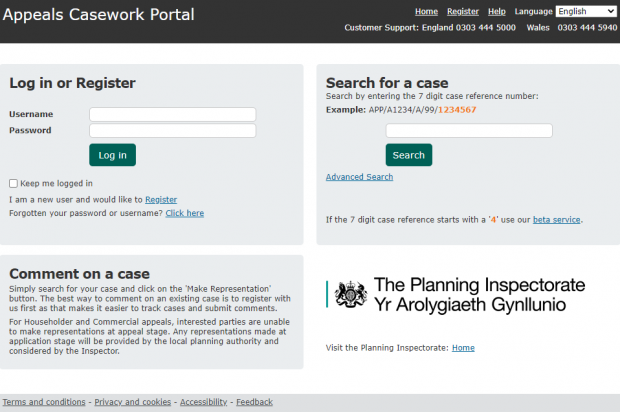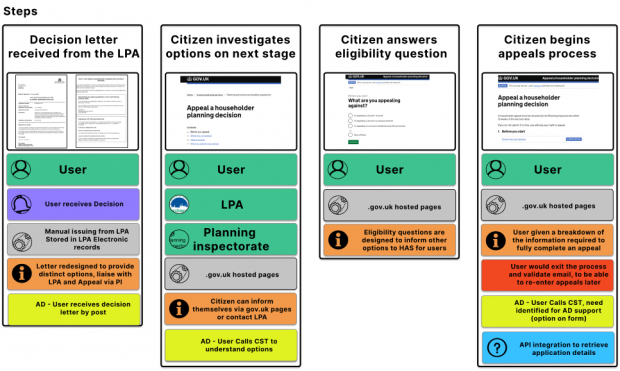Service transformation, not just iteration
One of the great things about stepping into the product manager role on a service you have worked with for years is that you already know all the problems. You don't have to worry about doing any more time-consuming research – you can just crack on with building the service.
Just kidding. In the words of Dr Manhattan, “Nothing ever ends”. Despite recently finishing the Alpha phase, we have found that Discovery never ends.
Over at the Planning Inspectorate we are transforming the Appeal a Householder Planning Decision service. The service lets householders appeal if their application for home improvement works is refused by their local council. From a digital perspective, it’s a live service that was built almost a decade ago but hasn’t been iterated since.
A service without a manual
Despite fears that the world would end, the Planning Inspectorate launched the Appeals Casework Portal in 2012. It does many things well, but it withers under the light of modern user experience and service standards.
That’s not a surprise when you consider its age and that it was built prior to the inception of the GDS Service Manual - a dark time in history!
We recognised that the live service no longer met the needs of our users... and it turned out that we needed to do some work to find out what those user needs were.

The current service. Definitely not optimised for mobile.
Even though this is a service for homeowners, and our simplest in terms of user input, 80% of the householder appeals we receive are via an agent of some kind, for example an architect or planning consultant. We wanted to change that, and ensure that householders can appeal without help.
You can choose to pay an agent to appeal if you want to, but it should not be a necessity or a prerequisite for a particular outcome. We started a comprehensive programme of user research to understand our potential service users and their needs. We found out that they:
had very poor awareness of the existence of the service itself did not know Planning Inspectorate was independent from their local council were confused by the terminology used in our service did not know how long it would take to get a decision on their appeal
As they have already spent months on plans and dealing with the council hoping to extend their home to accommodate their growing family, and then their plans are refused, our users often come to us in an anxious state.
Mapping user journeys
So, where to start? Where does our service begin? Surely the ‘Start now’ page on GOV.UK, right? Not in this case. We discovered our service begins with a document that is not even issued by us.
The decision notice is a letter produced by local councils that informs applicants of the success or failure of their planning application. These notices vary wildly from council to council, as does the guidance on how to appeal if they have been refused permission.
If we were to prevent our users from being ‘lost down the sofa cushions’ of the planning system, we needed a model version of this notice that gives the homeowner all the information they require to make the best decision for them.
Initially I was worried about spending too much time on this – what if the councils did not want to use it? So far, the small group we have talked to have been very receptive. There are hundreds of councils, but to bring about effective change we need to engage with them directly. Another lesson we learnt from our Alpha.

A journey map showing the stages in the appeals process.
Finding the opportunities to transform
Later on in the appeal submission journey, users are asked to provide a written statement to support their appeal - an opportunity for them to put their case forward and respond to the council's decision to refuse permission.
Our research showed that this is the most likely point for our users to:
pause and do some research decide that they need help from a professional planner drop out altogether
In the past, we avoided providing too much guidance because we felt it compromised our impartiality. We have reconsidered this position – designing a good interaction means making this as simple as possible for the user and giving them help to complete it. But we are not giving any user custom advice, just enabling them to engage properly with the process.
Finally, we discovered that while we ask the user for a lot of data, very little of that is ‘new’ – they have already supplied most of it to their council at application stage. So even though that data is held elsewhere, the user feels that they are being asked for things twice.
We have now hit our biggest technical challenge and the biggest opportunity for transformation. Integration with the wider planning system could change the service for users - and for the Planning Inspectorate – beyond all recognition. And our Alpha phase is running alongside the incredibly exciting work being done in the Reducing Invalid Planning Applications and Back Office Planning System projects.
Build a team and have fun
So now I am product manager of a service with big ambitions. And the reason it feels achievable is because we have an incredible team of specialists who are collaborating every day - researching, refining, innovating.
I have come to realise how essential user researchers, service designers, interaction designers, content designers and business analysts are to building a successful service (we have not had many of these roles in the Planning Inspectorate before). They are the reason we passed our Alpha assessment. Every day, they help open my eyes to a new way of looking at things, and it's genuinely exciting.
There are always new things to find out about your customers, your service and your organisation. And it's fun to be surprised by what you discover on any given day. To operate under the assumption that you will never know everything there is to know about your service. Even decades of experience can be subverted.
As a colleague said to me during a recent show and tell: "I've worked here for 30 years, and I've never known that to be a problem."
Ah. But you are still in Discovery.
Subscribe to the MHCLG Digital blog for more updates on our projects.
When you subscribe to the blog, we will send you an e-mail when there are new updates on the site so you wouldn't miss them.

Comments